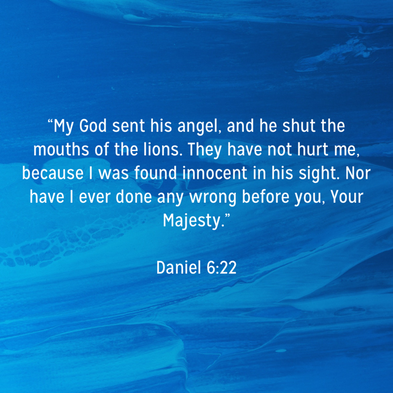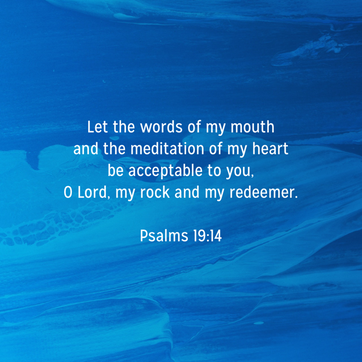|
Good morning!
We're so glad you chose to join us today!
When we meet in person, we share our joys and concerns with each other. If you have prayer requests to share, you can add them to the comments on this post. When you are ready, you may use the prayer below to get started:
Lord, we confess that you are with us and that you have the power to help us in every situation. Yet we often get so caught up in the busyness of our daily lives that we fail to pray or we approach you only with shallow and selfish prayers.
Give our relationship with you the depth and consistency of Daniel, who could not stop praying any more than he could stop breathing. Help us to rely on you for every moment of our lives, in good times and in struggles. For we ask it in Christ’s name. Amen.
Today's lesson is on Daniel 6:10-11, 14, 16, 19-23, 26-27. You can also read it with all of the skipped verses here.
Lesson context
Several years have passed since the events of last week’s lesson, when God protected the lives of three faithful Jewish exiles from a fiery furnace. In the meantime, the Persian Empire has arisen and replaced the Babylonians. As our lesson begins, a Persian king named Darius has appointed 120 “satraps,” who were subordinate provincial officials under the authority of three administrators, including Daniel. The king preferred Daniel and planned to give him authority over the entire kingdom, but this led to envy among Daniel’s peers. Therefore, they schemed against him. When they couldn’t find any fault in Daniel’s work on behalf of the king, they developed a trap from which even Darius would not be able to release Daniel. Since Daniel was trustworthy and was not corrupt or negligent, the schemers realized their plan had to pit Daniel’s loyalty to the king against his loyalty to God. Knowing that Daniel prayed to God faithfully each day, they encouraged the king to announce a decree that anyone who prayed to any deity or man except the king for 30 days would be thrown into a den of lions. Darius did so.
Violation and consequence (Verses 10-11, 14, 16)
Despite the decree, Daniel continued to pray as always, and his peers soon reported him to the king. The Law of Moses commanded people to remember God’s commands daily. At the dedication of Solomon’s temple, the Lord commanded the people to pray toward Jerusalem and the temple during times of distress. However, there was no command to kneel and pray three times a day. This was a part of Daniel’s personal spiritual routine, and he would do it regardless of the consequences. As a group, the men went to find Daniel praying and asking God for help. When the king learned about it, he was distressed and made every effort to save him. However, the officials reminded him of his decree and how Daniel had violated it. Darius realized he had been manipulated because of envy and selfishness. The king had been naive and had failed to see that he was being used as a pawn in the plot. Instead of being angered by Daniel’s disobedience, he was displeased with himself. A similar thing happens in the book of Esther, when a Persian king issues a decree that he cannot revoke. Because there is no non-biblical reference to such laws, the exact stipulations are unknown. However, it seems that it was impossible even for the king himself to reverse his decree. As required, the king gave the order for the consequences to be carried out. According to the lesson, an excavated Assyrian relief dating to the seventh century BC depicts Assyrian royals hunting lions for sport. Such lions were kept in dens before being released into an arena for “hunting.” The Assyrians practiced a form of polytheism, believing in many gods, but Darius recognized that Daniel prayed to one God. Although some think believe the king was speaking with skepticism or even sarcasm, It seems most likely that the king sincerely wanted Daniel’s God to rescue him and believed God could do it. His faith contrasts with that of Nebuchadnezzar in the previous lesson. In that story, the king doubted that any god could rescue the three men from the furnace. Only after seeing it for himself did he admit that “no other god can save in this way.”
Release and vindication (Verses 19-23, 26-27)
Although not a part of the printed lesson, the Bible says that the mouth of the den was sealed with a stone, secured by the king’s own signet, and that the king spent the night without eating, without entertainment and without sleep. It is clear that the king is fully invested in Daniel’s plight. Therefore, at first light he rushes to the lions’ den, knowing that the only way Daniel could survive was by God’s intervention. As he approaches the den, Darius calls out, “Daniel, servant of the living God, has your God, who you serve continually, been able to rescue you from the lions?” The words are important. Darius is gaining a deeper understanding that Daniel’s God is a living God who is able to intervene in human situations, unlike the so-called gods of the Assyrians. Even though Daniel came to the perilous situation because of the king’s lack of insight, Daniel did not disrespect or hold a grudge against Darius. “May the king live forever!” he responded. This is the first and only time in the book that a Jewish person greets a king in this way. Daniel testifies that God sent an angel who shut the lions’ mouths and that God did this because God found Daniel innocent. This does not mean that Daniel was perfect but only that he tried to follow God’s laws and to serve the king faithfully. The king’s anxiety turns to joy and gladness over Daniel’s condition. Daniel did not have a wound on him, and it was because he trusted in God. This does not imply that faithfulness obligates God to save believers from death. Some believers have experienced martyrdom, but all who remain faithful are promised eternal rewards. In either case, public displays of faithfulness have a transforming influence on the community. This was true in Daniel’s case. Darius issues a decree that the entire kingdom must fear and reverence the God of Daniel
Conclusion
Public confessions model something meaningful for today’s Christians. It’s easy to think of “confession: as an admission of sin, especially in a lurid, tell-all fashion. But that is not what the word means when describing the texts in Daniel. Here, the confession tells good news. The Lord chose to deliver Daniel, which resulted in the king’s surprising new edict. Daniel’s confession what happened with the lions and the king’s reaction reoriented both the characters in the story and those reading about them to a larger truth. God’s reign is both eternal and full of goodness. God’s loyalty to his people reflects God’s divine character and the large-scale divine plan to redeem humanity. Daniel knew that, and eventually, so did Darius. So do we. The church continues to confess its sins but also God’s redemption. Our life of celebration begins where Darius ended his learning experience. By repeatedly confessing God’s goodness, we bring those outside within hearing distance of the gospel itself. Daniel did so by his faithfulness in this story, and we do so too when we confess the gospel of our salvation.
Prayer
Living God, you care for your people and have promised to be with us no matter what we face. Give us the courage to face adversity and maintain faithfulness to you. Help us behave with mercy to those who have sought to harm us. Show us how to follow you in a manner that brings other people closer to you. In the name of Jesus. Amen.
Questions for discussion
Benediction
This week's benediction is from the New Revised Standard Version.
Next week's lesson will be on Habakkuk 2:1-5.
0 Comments
Leave a Reply. |
AuthorWe are a small, rural Presbyterian church in southwestern Pennsylvania. Archives
July 2024
Categories
All
|



 RSS Feed
RSS Feed